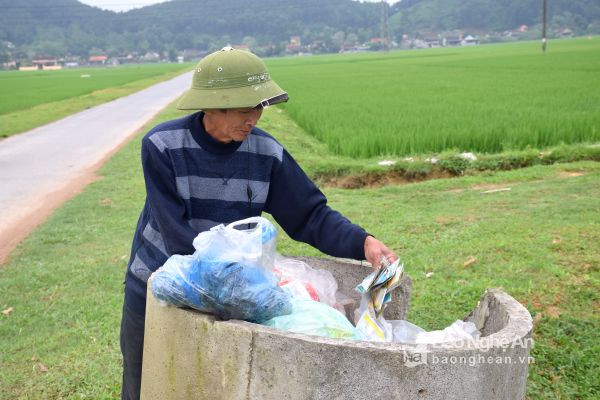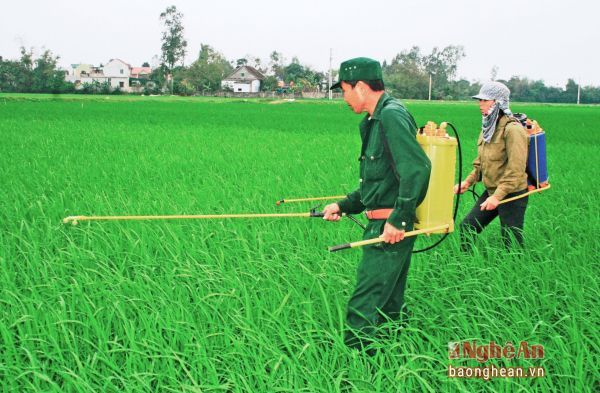Need to properly handle plant protection waste
(Baonghean) - At this time, spring rice is in its growing period, and at the same time, many types of pests and diseases appear, which means that farmers have to use a large amount of pesticides to prevent and control them. However, proper disposal of pesticide waste is an issue that needs attention today.
 |
| Many trash bins in Bac Thanh commune (Yen Thanh). Photo: Xuan Hoang |
Garbage litteredpesticide packaging
In many localities, although agricultural waste bins have been placed in the fields, the amount of pesticide waste collected and disposed of is not much. In the rice fields of Hoa Son commune (Do Luong), there are quite a few agricultural waste bins placed on the internal roads, close to water sources, but pesticide packaging of all kinds is thrown away on the banks of the fields or in the canals.
Mr. Thai Dinh Dieu, who was inspecting the fields, shared: “Many farmers are not aware of environmental protection. After using pesticides, they throw the packaging carelessly on the banks of the fields. The excess amount of pesticides in the packaging pollutes the water source and the plants on the banks, causing poisoning of grazing cattle and buffalo, and also affecting aquatic life...”.
Seeing that, every day when he was herding buffaloes in the field, he often picked up pesticide packages lying around on the edge of the field to put them in the bins placed in the field. As for himself, before going to the field to spray pesticides, he always had a plastic bag ready, if the field was far from the trash bin, after using the pesticides, he collected the packages and put them in the trash bin in the field.
Meanwhile, Bac Thanh commune (Yen Thanh) has received investment from the Department of Natural Resources and Environment in 100 concrete waste bins placed in rice fields, designed with rain-proof covers. However, in reality, many of the waste bins are tilted, have lost their covers and are often “lacking” waste, while agricultural waste of all kinds, especially pesticide packaging, is thrown along the rice fields and ditches.
Mr. Tran Danh Luong - Chairman of Bac Thanh Commune People's Committee admitted: "The trash bins in the fields were invested in 2015. During use, many trash bins were tilted, not repaired, and many even lost their covers, allowing rainwater to get in and spill out. The commune will then assign the agriculture and agricultural extension department to inspect and repair the bins that are not placed in the right position, to promote the effectiveness of trash bins in the fields; At the same time, actively propagate and remind people to arbitrarily throw pesticide packaging into trash bins so that the locality can have solutions to collect and handle them safely."
| Every year, Nghe An province uses about 300 tons of various pesticides, equivalent to 15 - 20 tons of packaging. However, due to the low awareness of many farmers, the amount of pesticide packaging waste collected for treatment is very small. |
Need to raise awareness of environmental protection
The province’s agricultural production has made remarkable progress, with agricultural products increasing in both quantity and quality. These results are thanks to farmers applying scientific and technological advances to production.
However, in the process of using pesticides, farmers accidentally or intentionally throw pesticide containers into the fields. This situation is the direct cause of environmental pollution (for soil, water, air), affecting human health.
 |
| Every year, Nghe An uses 300 tons of pesticides, so there are 15 tons of waste from this activity. Photo: Phu Huong |
To date, the province has placed about 1,600 pesticide waste collection bins in 10 districts, invested by the Department of Natural Resources and Environment, the Department of Crop Production - Plant Protection and a number of localities. Accordingly, each year the Department of Crop Production - Plant Protection collects and processes 2 - 3 tons of pesticide packaging waste at a time according to safe procedures.
According to preliminary calculations, each year in the province there are about 15 tons of pesticide packaging, so each year there are more than 10 tons of pesticide packaging that have not been properly treated. It is worth mentioning that, according to the Department of Crop Production and Plant Protection, the amount of remaining pesticides accounts for 5 - 10% of the amount of pesticides in the packaging.
Pesticide packaging is one of the hazardous wastes that need to be collected, treated and destroyed to ensure safety and limit the impact on the health of farmers and the community. In addition to propaganda work and the construction of centralized pesticide packaging collection bins in the fields, authorities at all levels need to increase inspections, promptly remind, as well as take corrective measures to join hands in protecting the environment.
» Nghe An parishioners expose the corruption of priest Nguyen Dinh Thuc
Xuan Hoang


